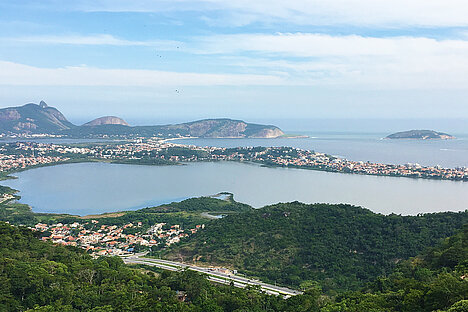- DE |
- EN
Right of way for bicycles and pedestrians in the Ecuadorian capital
Overview
In Quito, many people have started travelling by bike during the Covid-19 pandemic. This momentum has to be used to change people’s mobility behaviour also in the long-term.

Background
In Quito, less than 30 percent of the population uses private vehicles, but many want to have one. More than 80 percent of public space is reserved for cars and it is difficult to win back this space for other uses.
However, during the Covid-19 pandemic, people have started to realise the negative effects of car traffic such as air pollution, noise and traffic congestions.
A metropolitan ordinance clearly states that bicycles and pedestrians are a prioritised means of transport.
Objectives
The City of Quito aims to make sustainable infrastructure permanent and extend its bicycle route net. Freight forwarding shall become more sustainable and delivery services should opt for bikes instead of motorised delivery vehicles.

Activities
The municipality involved the community in all major planning steps, e.g. for bike lanes to be built. In addition, closer cooperation between several departments in the municipality was necessary. Frequent monitoring provides the municipality with data on air pollution, noise, regular and delivery traffic, walkability and people’s movement in general.
As bicycle traffic increases, other infrastructure such as parking facilities for bicycles also has to be built.
In a pilot project, Quito´s city centre will be pedestrianised for three days. If this project is successful, it could become a permanent measure to foster sustainable mobility.
Effects
Since the beginning of the Covid-19 pandemic and the implementation of certain cycling infrastructure, Ecuador’s capital Quito has experienced a 600 percent increase of cyclists in the city.
Bike lanes popped up during the pandemic and many people want to maintain them and make them permanent.
In addition, the bike industry and related trades have increased.

Conclusions
It is important, but difficult to convince people of the benefits of active mobility and to change their habits. The Covid-19 pandemic changed people’s attitudes to a certain extent, but there is still the risk that people want to return to the “old normal”.
Further information
Quito, Ecuador is taking strong actions to improve air quality
UN-Environmental Program
https://www.cleanairblueskies.org/story/quito-ecuador-taking-strong-actions-improve-air-quality
From Pop-Up to Permanent – Hopes and Dreams for Latin American Cycling Infrastructure
Bycs
https://bycs.org/from-pop-up-to-permanent-hopes-and-dreams-for-latin-american-cycling-infrastructure/
Published: 22/02/2022
Contact
Fernando de la Torre
Director of sustainable transport means
Municipality of the Metropolitan District of Quito
secretaria.movilidad(at)quito.gob.ec
++593-2 3952300 Ext: 14013













